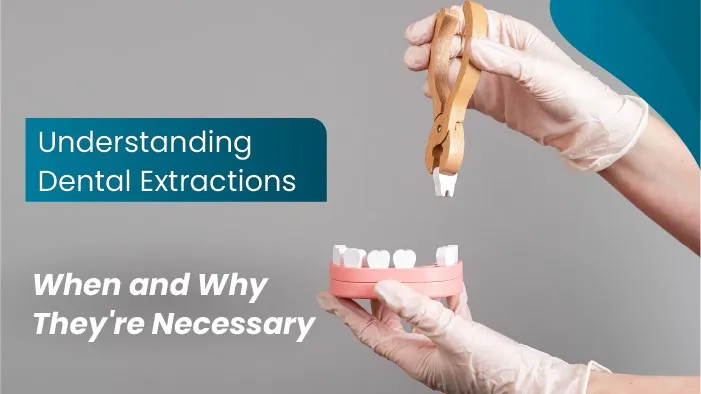Understanding Dental Extractions: When and Why They're Necessary
September 14, 2024
A tooth extraction is the last resort treatment suggested by dentists, but most people are very anxious about the same, as the tooth has to be completely removed from its dental alveolus or socket. Whether it is for children or adults, extractions are only performed when there is a complication in the teeth, gums, tooth-gum alignment, infections, decay or damage.
This procedure is done under 'general / local anaesthesia' so that it is as painless as possible. Based on the patient's individual condition, the extracted tooth may be replaced with a crown, a dental implant or a similar oral health solution.
Here are some reasons why a dentist will schedule an extraction:
- Infections:
When a dental infection occurs, it is usually controlled via medication and dental intervention. However, when the infection does not subside and impacts the adjacent teeth or gums, an extraction is imperative.
- Overlapping teeth
In some cases, a person may have an overlapping tooth, which may not only be visible in a person's smile, but also affecting the inner tooth and creating discomfort while chewing or speaking.
By extracting the protruding tooth with precision, the person is able to experience more ease, and also feel relieved of the awkwardness of having a toothy grin.
- Irreparable tooth decay or damage
If there is a fractured, chipped or broken tooth, or there is severe decay which is neither treatable nor reversible, and it has affected the root structure, the only way to prevent further damage is to extract the impacted tooth.
- Gum infection / Periodontal disease
Periodontal disease is an infection of the gums, caused by bacteria found in dental plaque. It starts out as gingivitis and then spreads to the periodontal ligaments, alveolar bone and other structures. This sometimes results in a tooth becoming loosened from the gums, and may have to be removed.
- Wisdom tooth growing incorrectly
At some point in their mid 20's, several adults grow an additional 3 to 4 teeth, known as wisdom teeth. These teeth usually grow at the back of the mouth, and are also called the 'third molars'.
At times, due to their position in the jaw, they may grow in a direction which either pushes the adjacent tooth, starts bothering the inner mouth and tongue, or juts outwards into the cheek. This leads to jaw pain, sensitivity, inflammation and stiffness. In such cases, dentists feel it is advisable to extract the troublesome wisdom tooth, and avoid possible infection or complications.
Today, there are advanced solutions for all oral health issues, and the specialist will always try and first protect the teeth and gums using these available treatments. It is only when other options have been ruled out that an extraction is recommended.
When advised an extraction, it is important to speak to your trusted dentist to understand the procedure, treatment plan and its outcomes, and only then take an informed decision. Always inform your specialist in advance about any allergies, health issues or prior medical history, before the extraction.
To consult one of our dental specialists at Apollo, please contact: 18001020288



















































